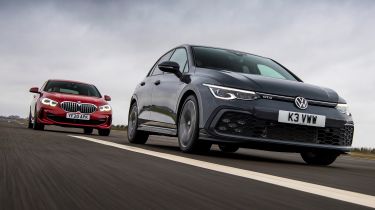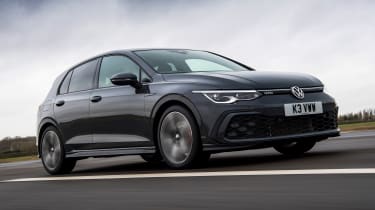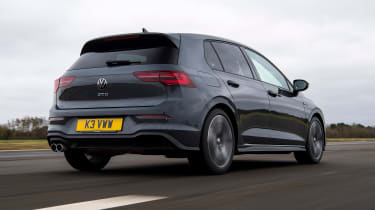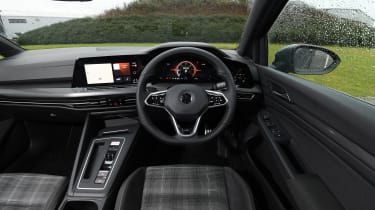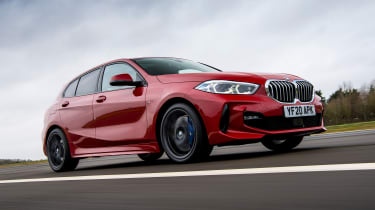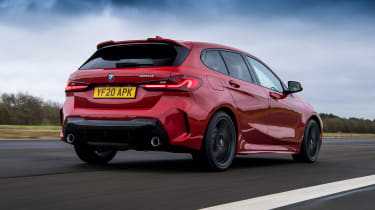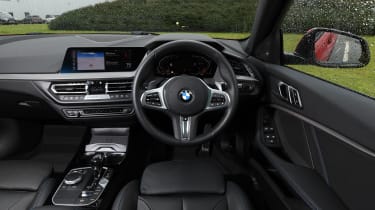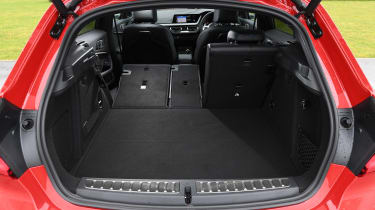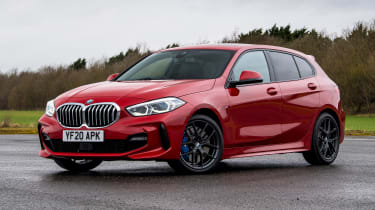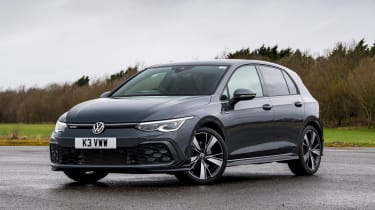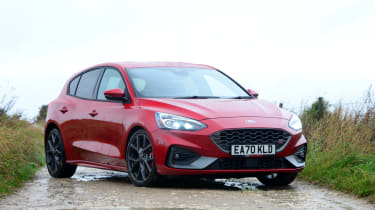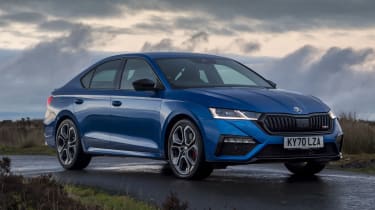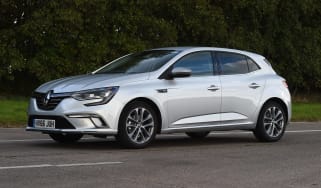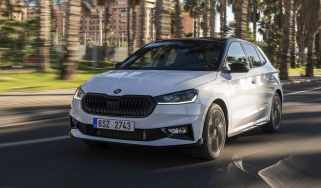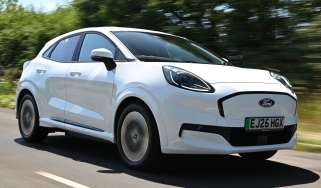Volkswagen Golf GTD vs BMW 120d
Can the Volkswagen Golf GTD or BMW 120d prove diesel isn't dead?
The clock may be ticking on the internal combustion engine, but diesel has been in the dock for a number of years. The Volkswagen emissions scandal was the turning point for the industry and diesel, as customers began turning their backs on the fuel that for so long had kept running costs to a minimum.
But for some people, diesel remains a perfectly sensible choice, even in performance cars. Here we’ve brought together two pacey choices in the VW Golf GTD and its main rival from BMW, the 120d M Sport.
The new GTD complete’s VW’s trio of hot GT-badged Golfs in the line-up, sitting alongside the GTI and plug-in hybrid GTE. This diesel hot hatch is the quickest and most advanced VW has ever produced; it uses a new 2.0-litre diesel engine that develops 198bhp and 400Nm of torque. For those looking to combine performance and low running costs, the GTD has long been the go-to option.
Yet BMW does have an alternative: the 120d M Sport. This model was once the backbone of the 1 Series range, but with the introduction of a lower- capacity petrol engine, the 120d has slowly moved up in the performance stakes so it can now be considered a diesel hot hatch. It’s down on power against its German competitor, but only slightly, developing 187bhp and 400Nm. But which model should you opt for? Let’s find out.
Volkswagen Golf GTD
| Model: | Volkswagen Golf 2.0 TDI GTD 200PS DSG |
| Price: | £32,840 |
| Engine: | 2.0-litre 4cyl turbodiesel, 198bhp |
| 0-62mph: | 7.1 seconds |
| Test economy: | 42.1mpg/9.3mpl |
| CO2: | 137g/km |
| Annual road tax: | £150 |
The GTD is the fast-but-frugal version of the latest Volkswagen Golf Mk8. It’s powered by a 198bhp 2.0-litre diesel engine and has a seven-speed DSG automatic gearbox as standard. It’s only available in one trim and prices start from £32,840.
Used - available now

2020 Fiat
500
32,489 milesManualPetrol1.2L
Cash £6,750
2023 Mercedes
A-Class
61,500 milesAutomaticDiesel2.0L
Cash £15,850
2015 Suzuki
Celerio
32,612 milesManualPetrol1.0L
Cash £4,700
2016 Nissan
Qashqai
23,213 milesAutomaticDiesel1.6L
Cash £13,750Design & engineering
For those looking to combine hot-hatch performance and low running costs, the Golf GTD has long been a great option. It used to outsell the Golf GTI, too, but recently that has changed in line with the public’s perception of diesel.
This latest Mk8 GTD is the most powerful and fastest version of the hot diesel hatch VW has ever developed. It pairs a 2.0-litre four-cylinder turbodiesel with a seven-speed DSG gearbox; there’s no option of a manual this time around.
It develops a total of 198bhp and 400Nm of torque, which VW claims is good for a 0-62mph time of 7.1 seconds – 0.2 seconds faster than the BMW 120d it faces here. Equally impressive is the claimed 600-mile range on a tank of fuel, thanks to WLTP fuel economy of 54mpg.
The GTD’s suspension set-up is fairly conventional for the class, comprising a MacPherson front axle and a multi-link set-up on the rear. There’s no mechanical limited-slip differential, like you get on a Golf GTI, but the GTD does use VW’s XDS electronic diff lock, which helps to harness the car’s power and improve the handling by tweaking the brakes of the inside wheel while you’re cornering.
There are a few subtle design tweaks to mark the GTD out as the hot diesel. These include the honeycomb-style LED lights in the front bumper, the unique 18-inch alloy wheels and twin rear exhausts. However, the latest version of the GTD very much retains its understated style as before.
Aside from a few GTD badges and a unique look for the 10-inch digital cockpit, the cabin is exactly like what you’ll find in a regular Golf; it’s well built, logically arranged, apart from the baffling temperature controls, and finished with a sense of solidity.
Driving
That sense of familiarity also extends to the way the GTD drives, which is to say that its steers and handles sweetly. There’s no immediate telling that you’re in a performance-focused Golf, because the low-speed ride is supple and controlled, and the steering is light but precise enough.
Increase the pace, however, and the GTD’s punchy 2.0 TDI diesel really begins to make its presence felt. The engine’s peak torque of 400Nm is available from only 1,750rpm, so almost from the moment you squeeze the throttle you have immediate access to
a great slug of power. It means that on the road the GTD feels quicker than its claimed 0-62mph time of 7.1 seconds suggests. It’s helped by the seven-speed DSG shifting up gear well before the rev limiter, at around 3,000rpm, to keep the motor in its power band.
Although this is a hot Golf, the engine is more effective than fun and not as engaging as the petrol turbo you’ll find in the Golf GTI. However, VW’s clever XDS electronic diff lock means the GTD is pretty nimble through the corners. The brake nibbles on the inside wheel to help tighten the car’s line through a bend, and it works, although we just wish the steering had a bit more feel to it.
Flick the optional Dynamic chassis control (£785) into Sport mode, and everything tightens up. You get a sharper throttle response and good body control without sacrificing the Golf’s supple ride.
However, the steering takes on an artificially heavy weight, and an unpleasant fake engine noise is pumped through the speakers. Thankfully you can configure the car to suit the specific traits you like using the Individual setting.
Practicality
With the Golf Mk8 being based on the same MQB platform as the Mk7, boot and passenger space inside the GTD is pretty close to what was on offer in its predecessor.
The 2,626mm wheelbase is fractionally longer than before, but still marginally down on what you get in the 1 Series. Yet there’s still enough space in the back for three kids or two adults. The 374-litre boot is a good size and par for the course in the class.
There’s a decent amount of storage up front, including a covered smartphone charging pad, good-sized doorbins and an adjustable armrest with a cubby hole beneath it. It’s a little frustrating that you have to pay extra for options such as a reversing camera (£300), heated front seats (£270) and a head-up display (£625), though.
Ownership
The GTD comes with a raft of safety technology, such as lane assist, adaptive cruise control, Car2X intelligent vehicle networking and a full suite of parking sensors.
VW didn’t perform all that well in our Driver Power 2020 customer satisfaction survey, finishing mid-table in 19th. However, it was well ahead of rival BMW, which finished a lowly 27th out of 30 brands.
Running costs
Over the course of 12 months, the GTD is the cheaper car to buy and run when compared with this variant of the 1 Series. The VW’s list price, without options, is almost £1,500 less, while servicing and insurance alone are around £400 cheaper per year.
On test, the GTD was the more efficient of the two cars here, but only just, averaging 42.1mpg against the BMW’s 40mpg. That means over 12,000 miles you can expect to pay around £1,500 on fuel.
The change in rules for company car tax means the GTD and 120d aren’t as cheap to run as they were. Lower-rate earners will pay £1,954 annually to run the VW as a company car, which is £4 more than the BMW. For higher-rate earners that bill increases to £3,908.
Testers’ notes
“The VW Golf has always had a broad breadth of abilities, and this Mk8 is perhaps the most versatile of them all. You can choose from petrol, plug-in hybrid and diesel performance versions.”
BMW 120d
| Model: | BMW 120d M Sport |
| Price: | £34,440 |
| Engine: | 2.0-litre 4cyl turbodiesel, 187bhp |
| 0-62mph: | 7.3 seconds |
| Test economy: | 40.0mpg/8.8mpl |
| CO2: | 137g/km |
| Annual road tax: | £150 |
Although not badged as a hot diesel, the BMW 120d is a match for the VW when it comes to power, performance and desirability. It’s the more expensive of the two cars here, costing from £34,440, but is it a match behind the wheel?
Design & engineering
The 1 Series has long been the backbone of the BMW line-up and the entry point into ownership of the brand’s range. As an all-rounder, it ticks the boxes when it comes to a practical, quick and premium family car.
Until recently the 120d made up a huge chunk of 1 Series sales, making use of a punchy 2.0-litre diesel engine that delivered decent performance and low running costs. But over the years the popularity of lower-capacity but equally powerful turbo petrol engines has begun to chip away at diesel sales.
Nevertheless, the 120d tested here remains a solid choice for numerous reasons. It’s still powered by a 2.0-litre diesel engine, but BMW has slowly turned up the power over time to the point where it can now be considered a diesel hot hatch to rival the Golf GTD, even if it isn’t badged as one.
The 120d develops 400Nm of torque and 187bhp – only a fraction less than the GTD – and is capable of 0-62mph in 7.3 seconds, according to BMW. The engine drives the front wheels through an eight-speed automatic transmission and, like the Volkswagen, no manual option is available.
But unlike the GTD, the 120d can be specced in either Sport or M Sport trims. The higher-spec M Sport model we have here gets a racier bodykit and more generous equipment list, although some kit, such as a heated steering wheel and head-up display, are bundled into pricey option packs rather than being available as individual additions.
The rest of the cabin, however, feels more premium and better built than the Golf’s. Build quality is first rate, while the overall layout and placement of the controls feel more intuitive. And although BMW’s iDrive 7.0 infotainment system is a few years older than the VW’s system, it remains the slicker of the two set-ups.
Driving
The 1 Series was one of the first BMW models to go front-wheel drive, but the 120d remains a very impressive family hatch to drive.
Part of the reason for that is down to the car’s agile and adjustable chassis. In contrast to the Volkswagen, which feels quite composed and sure-footed, the 1 Series is more nimble and willing to change direction. The 120d doesn’t come with an electronic differential like the GTD’s, but the BMW’s inherent balance and agility more than make up for this.
The steering is far more direct than the Golf’s and gives you a much better idea of what the front wheels are doing and how they are reacting to your inputs. It allows you to carry greater speed through corners with more confidence.
While the 2.0-litre diesel doesn’t feel as lively as the VW’s motor from low down in the rev range, the BMW’s eight-speed automatic transmission does feel like a better fit with this type of engine when compared with the seven-speed dual-clutch automatic in the Volkswagen. It’s smoother with its changes and that extra gear makes motorway journeys that little bit more relaxing.
M Sport models come with lowered suspension, but even so the ride is very controlled and supple. It’s not immune from small bumps and ripples in the road surface, but it deals well with bigger imperfections and potholes because the damping stops them from making their way into the cabin.
Practicality
While the move to a front-wheel-drive platform didn’t really impact how good the 120d is to drive, it certainly boosted the car’s practicality. The 380-litre boot is marginally bigger than the Golf’s, but there’s only six litres in it, so in the real world it makes little difference.
The rear bench splits 40:20:40 for maximum flexibility, but is bizarrely a £150 option; once dropped the load bay increases to 1,200 litres, which is 34 litres down on what you get in the VW.
Where the 1 Series gets one over the Golf is passenger space. The wheelbase is 70mm longer, which doesn’t sound like a great deal, but jump from one car to the other and it’s clear that there is more kneeroom in the back of the 1 Series than in its competitor from Volkswagen.
Ownership
Like the Golf, the 1 Series scored a five-star rating in the Euro NCAP crash tests, thanks in part to its standard safety equipment, which includes autonomous emergency braking, lane-keep assist and six airbags. However, lane-departure warning and blind-spot assist are part of the £1,000 Driving Assistant package.
BMW finished 27th out of 30 manufacturers in our Driver Power 2020 survey, two positions worse than its finish the previous year. That was well behind Volkswagen, which secured 19th place in our 2020 poll. Neither of these brands will be happy about finishing so low in our rankings.
Running costs
On test the 1 Series couldn’t quite match the 42.1mpg fuel economy achieved by the GTD, falling short at only 40mpg. That means over 12,000 miles you’ll spend around £1,650 on fuel in the 120d, about £100 more than you will in the VW over 12 months.
The 1 Series is a match for the Volkswagen when it comes to being used as a company car, costing a lower-rate earner £1,950 per year in Benefit-in-Kind contributions and a higher-rate taxpayer £3,900.
The BMW has stronger residual values, too, managing to maintain 52.2 per cent of its value over three years compared with the VW’s 49.7 per cent.
Testers’ notes
“While few people could question the quality of engineering that has gone into the 1 Series, its design remains divisive, particularly the enlarged kidney grilles at the front.”
Verdict
First place: BMW 120d
The BMW comes out on top in this test, but only by a fraction, on account of its better chassis, more generous levels of kit and greater practicality. To buy outright as well as on a PCP deal it’s the pricier car, but you can feel and see where that extra money goes, from the superior infotainment system to greater levels of refinement. The 120d is a brilliant diesel hatch that proves there’s still some life in the fuel just yet.
Second place: Volkswagen Golf GTD
Volkswagen has once again developed a brilliant all-rounder in the latest Golf GTD. It continues to deliver strong performance and low running costs, but now combines those values with an improved chassis and technology. However, when the margins are so
small, factors such as build quality, infotainment and having a premium appearance can make a difference.
Also consider...
Ford Focus ST
- Model: Ford Focus ST Diesel
- Price: £30,250
- Engine: 2.0-litre 4cyl 187bhp
Ford is no stranger to hot hatches and the Focus ST Diesel is another cracking option for buyers in this segment. It develops a similar amount of power to the VW and BMW, backed up by a brilliant chassis and six-speed manual gearbox; its rivals are auto only. It may not have the premium appeal of its rivals here, but it’s great value for money and excellent to drive.
Skoda Octavia vRS
- Model: Skoda Octavia vRS Diesel
- Price: £32,280
- Engine: 2.0-litre 4cyl 197bhp
Mechanically, the vRS diesel has a lot in common with the Golf. The platform, engine and gearbox are all carried over, but the Skoda is larger and more practical. It’s also more versatile because the Octavia can be ordered as an estate and with the option of four-wheel drive. It’s also never looked so good.
Figures
| BMW 120d M Sport | Volkswagen Golf 2.0 TDI GTD 200PS DSG | |
| On the road price/total as tested | £34,440/£42,540 | £32,840/£35,660 |
| Residual value (after 3yrs/36,000) | £17,978/52.2% | £16,321/49.7% |
| Depreciation | £16,462 | £16,519 |
| Annual tax liability std/higher rate | £1,950/£3,900 | £1,954/£3,908 |
| Annual fuel cost (12k/20k miles) | £1,650/£2,750 | £1,568/£2,613 |
| Insurance group/quote/VED | 26/£817/£150 | 27/£547/£150 |
| Cost of servicing | £720 (3 years) | £386 (2 years) |
| Length/wheelbase | 4,319/2,670mm | 4,287mm/2,626mm |
| Height/width | 1,434/2,081mm | 1,478/2,073mm |
| Engine | 4cyl in-line/1,995cc | 4cyl in-line/1,968cc |
| Peak power/revs | 187bhp/4,000rpm | 198bhp/N/A |
| Peak torque/revs | 400Nm/1,750rpm | 400Nm/1,750rpm |
| Transmission | 8-speed auto/fwd | 7-speed DSG/fwd |
| Fuel tank capacity/spare wheel | 50 litres/£150 | 50 litres/£100 |
| Boot capacity (seats up/down) | 380/1,200 litres | 374/1,237 litres |
| Kerbweight/payload/towing weight | 1,525/550/1,300kg | 1,465/560/1,600kg |
| Turning circle | 11.4 metres | 10.9 metres |
| Basic warranty (miles)/recovery | 3yrs (unlimited)/1yr | 3yrs (60,000)/1yr |
| Driver Power manufacturer/dealer pos. | 27th/25th | 19th/22nd |
| NCAP: Adult/child/ped./assist/stars | 83/87/76/72/5 | 95/89/76/78/5 |
| 0-62mph/top speed | 7.3 secs/143mph | 7.1 secs/152mph |
| Auto Express econ. (mpg/mpl)/range | 40.0/8.8/440 miles | 42.1/9.3/463 miles |
| WLTP combined | 52.3-55.4mpg | 54mpg |
| WLTP combined | 11.5-12.1mpl | 11.9mpl |
| Actual/claimed CO2/tax bracket | 189/137g/km/29% | 180/137g/km/30% |
| Airbags/Isofix/parking sensors/cam. | Yes/yes/yes/£350 | Yes/yes/yes/£300 |
| Auto box/lane-keep/blindspot/AEB | Yes/£1,000/£1,000/yes | Yes/yes/yes/yes |
| Clim./cruise ctrl/leather/heated seats | Yes/yes/yes/yes | Yes/yes/no/£270 |
| Met paint/LEDs/keyless/pwr tailgate | Yes/yes/yes/£500 | £625/yes/yes/no |
| Nav/digi dash/DAB/connected services | Yes/yes/yes/yes | Yes/yes/yes/yes |
| Wireless charge/CarPlay/Android Auto | Yes/yes/yes | Yes/yes/yes |
